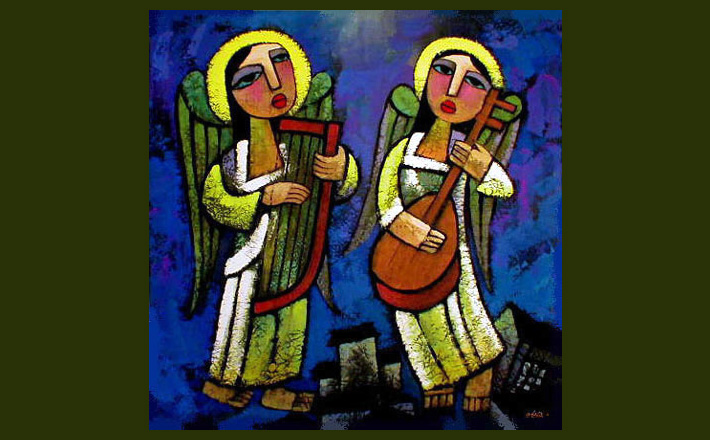Commentary on 1 Kings 8:22-23, 41-43
Last year’s lectionary cycle included longer selections from 1 Kings 8, at the heart of which is Solomon’s prayer at the dedication of the Jerusalem temple (1 Kings 8:[1, 6, 10-11] 22-30, 41-43).
In this week’s reading, only five verses are appointed: verses 22-23 present a sliver of Solomon’s opening address in the prayer, and verses 41-43 record one of seven petitions offered over the course of the prayer. What follows is a partial reproduction and reworking of the Year B commentary on the prayer as a whole, followed by additional reflections that focus on the particular petition found at verses 41-43.
Have you ever heard a public prayer in a worship service do “double duty,” announcing something to the congregation even while ostensibly addressing God in praise, confession, thanksgiving, or petition? “Thank you, God, for opportunities for fellowship, including the supper coming up this Wednesday at 6 p.m., for which everyone will bring a dish to share…” “Lord, please watch over our brother George, who was admitted to County Hospital Room 304 last night around 11 p.m. with chest pains…” While communal prayer necessarily and desirably communicates something to the participants as well as to God, there is a danger that we can allow our prayers to disintegrate into community announcements that we merely allow God to overhear.
Having addressed the assembly of Israel in the preceding verses, Solomon now turns toward the altar with his hands toward heaven to address God (8:22-53). He has physically oriented his whole self toward the deity. This bodily posture underscores the depth of focus of this prayer; speech to the congregation has ended, speech to God has begun. The clear delineation between Solomon’s prayer (verses 22-53) and the two addresses to the assembly that surround it (verses 14-21 and 54-61) highlights Solomon’s singularity of focus even in this public, liturgical setting. Solomon’s public prayer reminds us that God is always worthy of our full attention and address, not the remnants of our conversations.
Despite the fact that Solomon’s prayer is clearly separated from his speeches to the assembly, the text of the prayer itself is not without an agenda. Its language is thickly Deuteronomic, emphasizing covenant, steadfast love, and the fulfillment of promises made to David. For the author to have this language on the lips of Solomon helps to advocate for a particular worldview that runs through the books of Joshua, Judges, 1 and 2 Samuel, and 1 and 2 Kings.
Solomon’s accomplishment of constructing the Temple receives its primary theological importance from the notion that the Temple is a place where a worshiper knows that God can be encountered. Verse 27 emphasizes, however, that the Temple is not God’s “dwelling place” in the sense of “permanent residence”: “But will God indeed dwell on the earth? Even heaven and the highest heaven cannot contain you, much less this house that I have built!” (8:27). This interjection highlights the fact that God is present and accessible in this place, yet not boxed in.1
This week’s appointed reading includes one out of seven petitions offered by Solomon in this lengthy prayer. First Kings 8:41-43 asks that even foreigners who pray toward God’s house have their prayers heard and answered. Throughout the prayer the frequent repetition of the phrase “your people Israel” emphasizes the identity of Israel as God’s chosen covenant community. The lectionary’s focus on these verses about foreigners should not detract from the fact that Solomon’s prayer understands Israel alone as God’s chosen people. In fact, the prayer ends with the declaration that “you have separated them from among all the peoples of the earth, to be your heritage…” (1 Kings 8:53a).
At the same time, this petition proclaims that even those “not of your people Israel” will hear of the greatness of the LORD and come to the temple to offer prayers. By heeding the prayers of foreigners as well as Israelites, according to Solomon’s rationale, God will cause the peoples of the earth to know and fear the God of Israel, and “they may know that your name has been invoked on this house that I have built” (1 Kings 8:43). In other words, reverence from foreigners helps to show that, out of all the national deities being claimed by various peoples, the God of Israel is the most powerful one, and the house Solomon has built is where that God dwells. Solomon’s own international reputation is tied up with God’s; if Solomon’s God is a winner, so must be Solomon.
Preachers might consider human kingship and divine kingship, the relationship between chosenness and openness, evangelism, or even the functions of worship spaces in their reflections on verses 41-43 of Solomon’s prayer. There may also be some particularly fruitful dialogue possible between this text and portions of the book of Isaiah. The reflection on the role of non-Israelites in the glorification of the God of Israel in 1 Kings resonates with similar language in Deutero-Isaiah (Isaiah 40-55), the portions of the book of Isaiah dating immediately before the Judeans’ return from Babylonian exile. That text describes Israel, redeemed from exile, as “a light to the nations, that my salvation may reach to the end of the earth” (Isaiah 49:6b).
God’s work in Israel promotes God’s glorification and salvific work in the rest of the world. The text goes on, “Thus says the LORD, the Redeemer of Israel and his Holy One, to one deeply despised, abhorred by the nations, the slave of rulers, ‘Kings shall see and stand up, princes, and they shall prostrate themselves, because of the LORD, who is faithful, the Holy One of Israel, who has chosen you.’” (49:7). Again, God’s actions with Israel showcase both the glory of God and the status of God’s chosen people in the world.2
1For a helpful discussion of the nuanced implications of God’s “enthronement” in this passage, see C.L. Seow, “The First and Second Books of Kings,” NIB 3:68-79.
2See J. Kaminsky and A. Stewart, “God of All the World: Universalism and Developing Monotheism in Isaiah 40-66,” HTR 99.2 (2006): 139-63. They make the important point that “universal recognition” of Israel’s God in Deutero-Isaiah “does not equal a universal conversion to the worship” of Israel’s God (140).


June 2, 2013